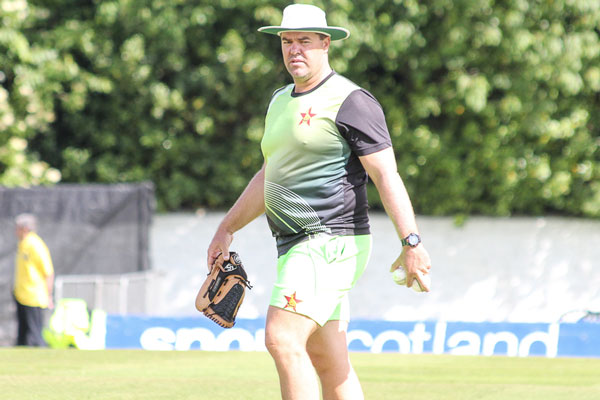
Cricket in Zimbabwe faces an uncertain future following the national team’s failure to qualify for the 2019 World Cup in England and Wales after a heartbreaking loss to minnows United Arab Emirates (UAE) in a make-or-break match last Thursday.
BY DANIEL NHAKANISO
The World Cup Qualifier hosts had two shots at qualification — needing to win one of their remaining two Super Six matches against either the West Indies or UAE.
Heath Streak’s (pictured left) men, however, failed to book their World Cup ticket on both occasions, failing to defend 289 against the two-time world champions on Monday, before crumbling in a rain-hit chase against UAE three days later.
Zimbabwean cricketers also look set to be the biggest losers as they blew away a golden opportunity to earn a windfall that comes with playing in the World Cup.
According to insiders, Zimbabwe Cricket [ZC] had pledged an incentive of $30 000 per player if they qualified for next year’s World Cup.
The lucrative incentive, sources said, was over and above more funding from the International Cricket Council (ICC) for qualification for the global showpiece.
“It’s a bit early yet to advise implications, but obviously the outcome has created challenges for ZC. It was devastating and heartbreaking,” ZC managing director [MD] Faisal Hasnain said.
- Chamisa under fire over US$120K donation
- Mavhunga puts DeMbare into Chibuku quarterfinals
- Pension funds bet on Cabora Bassa oilfields
- Councils defy govt fire tender directive
Keep Reading
“I genuinely felt for the players and our loyal fans as a father does when his child does not pass an exam or misses out on an opportunity. As a parent, it’s sometimes worse than what the child feels himself. But we will eventually learn from this and come out stronger, God willing.”
Three years ago the final 15-member squad and non-travelling reserves for the previous World Cup shared a whopping $650 000 among themselves for taking part in the World Cup in Australia and New Zealand in a deal that was sealed by their former player representative Eliah Zvimba.
The failure to qualify this time around is also expected to have dire consequences not least on the local cricket governing body, ZC, whose financial state is so parlous, with close to $20m owed to various financial institutions.
If Zimbabwe had qualified for the World Cup, ZC would have expected to receive hefty World Cup participation fees which would have been crucial in its quest for better financial health.
However, all that hope went up in smoke following the cricket’s side’s failure at the last hurdle, leaving ZC facing another financial crisis.
Soon after his appointment last year as ZC MD, Hasnain, a former ICC chief financial officer, said 2019 World Cup qualification would be “the most important thing on the table” for Zimbabwe.
With that in mind, ZC went for broke in its bid to ensure that the national side would have the best chance possible to qualify for the World Cup after embarking on an ambitious project to convince certain players who had left the country to return.
The duo of Brendan Taylor and Kyle Jarvis rejoined the Chevrons and the preferential treatment they received from ZC created divisions within the team.
Taylor and Jarvis are reportedly being paid more than they were getting at Nottinghamshire and Lancashire respectively and were also given a small portion as an advance to secure their return.
However, the flipside of that has been the toll it has taken on ZC finances. The local cricket board was unable to make full payments last month and only gave staff, including players, 40% of their salaries after another cash crunch caused salary delays over the Christmas season.
It is also understood that ZC owes the cricketers their match fees for the tour of Sri Lanka that took place in July.
Zimbabwe is not the only country expected to feel the pinch of missing out on qualification to the World Cup with Cricket Scotland chief executive Malcolm Cannon on Friday revealing that they expected to lose out on a reported £700 000 bonus in funding.











